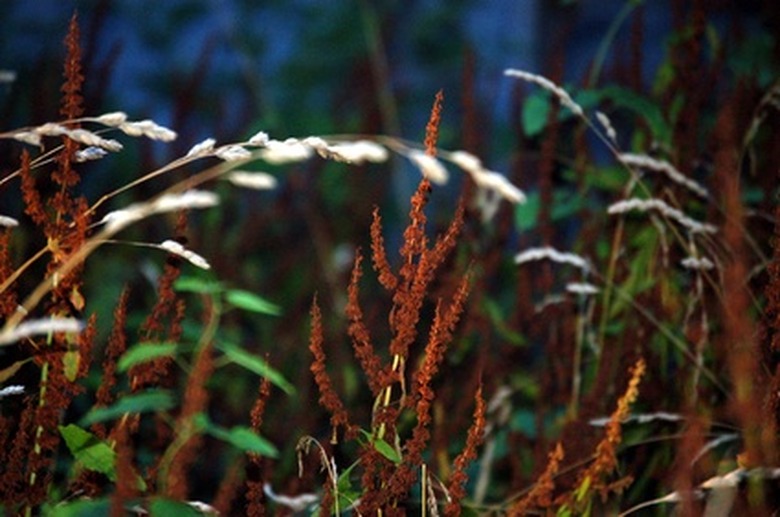Roundup Weed Control Precautions
Roundup is widely used across the North American continent to keep weeds and invasive plants in check. When sprayed onto a plant, the plant's cells rapidly absorb glyphosate–the plant-killing active chemical in Roundup–and transfer the chemical throughout the plant's entire system, resulting in death within 14 days. If you choose to use Roundup to maintain your landscape, take precautions to avoid unwanted results when applying this herbicide.
Health Risks
Wear proper safety gear and clothing when handling and using Roundup. If the product gets on skin or is ingested or breathed, it can cause severe gastrointestinal medical problems and irritations. Monsanto, the manufacturer, suggests chemical-resistant gloves that are 8 milli-inches (0.008 inches) thick and made with a material like neoprene rubber or butyl rubber. Protective eyewear, closed-toe shoes and coveralls are also suggested. Call the poison control hotline at 800-222-1222 if you ingest or come into contact with Roundup.
- Roundup is widely used across the North American continent to keep weeds and invasive plants in check.
- If you choose to use Roundup to maintain your landscape, take precautions to avoid unwanted results when applying this herbicide.
Wind Drift
Never spray Roundup during a breezy weather period. Wind can cause the spray to drift into undesirable areas, such as onto a waterway. Monsanto says that the potential for drift is lowest when wind speeds are below 10 miles per hour. Chemical additives are available at some nurseries and garden stores that help reduce drift when added to herbicides like Roundup.
Flammable Reactions
Roundup itself isn't flammable, but it produces an extremely combustible gas (hydrogen gas) when it comes in contact with any type of steel other than stainless steel. All holding tanks and mixing containers should be made of a non-steel substance, like plastic.
Non-Selective Killing
Roundup will kill all plants, not just weeds. When applying Roundup, take precautions to ensure the chemical is only sprayed on vegetation you want to kill. For example, if using a handheld sprayer, adjusting the nozzle to shoot out a thin jet rather than a wide-angled spray can reduce the chances of getting Roundup on plants you wish to keep.
- Never spray Roundup during a breezy weather period.
- Chemical additives are available at some nurseries and garden stores that help reduce drift when added to herbicides like Roundup.
References
- "Ecological Management of Agricultural Weeds"; Matt Liebman, et al.; 2007
